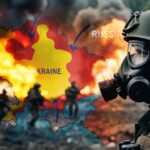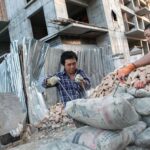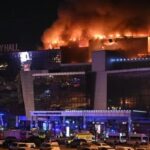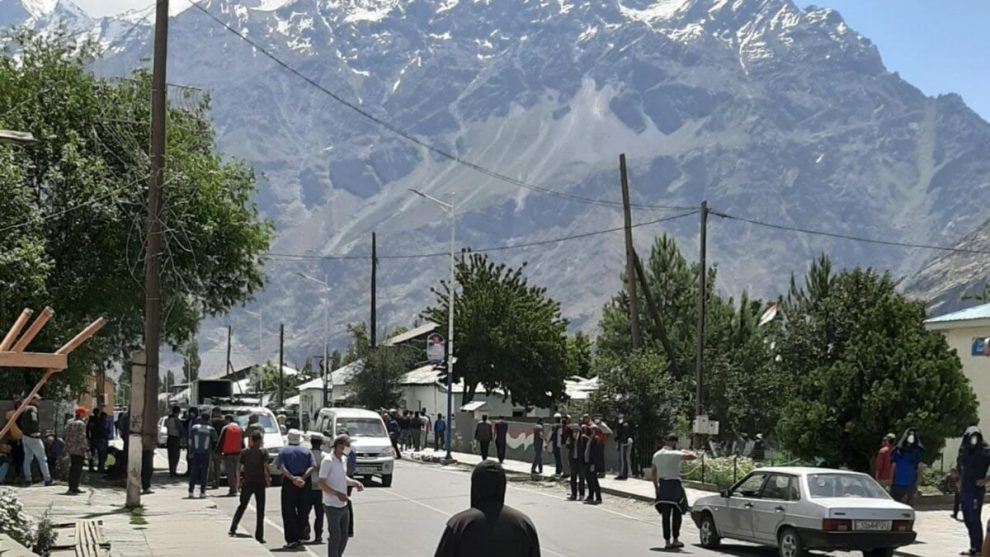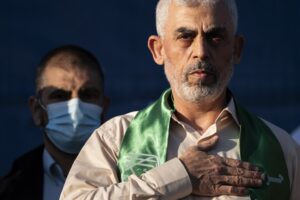Human Rights Watch (HRW) has called on Tajik authorities to stop the “wrongful detention” of residents of the Central Asian nation’s volatile Gorno-Badakhshan Autonomous Region (GBAO), dozens of whom have been arrested since protests in May protests and “are facing closed, unfair trials.”
In a statement issued on August 23, HRW said Tajik authorities had arrested and detained more than 200 residents in the GBAO, including at least 90 activists, on charges related to the protests and ensuing clashes. Some of those charged reportedly disappeared from Russia and were forcibly taken to the GBAO to face trial.
HRW’s Central Asia researcher Syinat Sultanalieva said in the statement that dozens of activists and other natives of the restive region “are facing unfair trials behind closed doors without access to lawyers.”
“Without lawyers, defendants can’t get a fair trial and are at greater risk of being tortured or otherwise mistreated,” Sultanalieva said.
The report comes a day after relatives of Salam Imomnazarov said the international judo master and son of one of the informal leaders of the GBAO had been sentenced to 16 years in prison for drug trafficking at the end of June.
Imomnazarov was detained at Dushanbe airport on February 19 as he returned from Turkey where he received medical treatment. He was charged, police said, because his name was mentioned by a drug dealer in 2015 during interrogation. Imomnazarov and his family have vehemently denied the charges.
HIs father, Imomnazar Imomnazarov, was killed in his house in Khorug in August 2012, a month after a government security operation was launched in the area that left at least 30 civilians, and 17 government soldiers were dead. Relatives blame the Tajik authorities for his death. The authorities deny any involvement.
One of Imomnazarov’s relatives, speaking on condition of anonymity, told RFE/RL on August 22 that the family was not informed of the trial date, and that the only contact allowed was with his sister, who saw him for only 10-15 minutes before the verdict was handed down.
“He told his relatives not to appeal against the verdict because he does not believe he will get justice and considers appealing to a higher court to be useless,” the family member said, noting Imomnazarov had pleaded not guilty.
In 1999, Tajikistan joined the International Covenant on Civil and Political Rights, which stipulates that everyone charged with a criminal offense is entitled to a fair and public hearing, has access to counsel and adequate time to prepare a defense, and is able to examine the evidence against them.
However, HRW says, the autonomous region has only seven lawyers who are officially registered as members of the GBAO Bar Association to cover the region’s population of 250,000.
Lawyers from other regions of the country report being warned against taking up the cases of those arrested, while others fear retaliation. Several of those charged are reported to have been forcibly taken from Russia and brought to the region to face trial.
Deep tensions between the Tajik government and residents of the GBAO have simmered since a five-year civil war broke out shortly after the collapse of the Soviet Union in 1991.
Protests are rare in the tightly controlled nation of 9.5 million where President Emomali Rahmon has ruled with an iron fist for nearly three decades.
The latest crackdown on activists in the GBAO followed protests initially sparked in mid-May by anger over the lack of an investigation into the 2021 death of an activist while in police custody and the refusal by regional authorities to consider the resignation of regional Governor Alisher Mirzonabot and Khorugh Mayor Rizo Nazarzoda.
The rallies intensified after one of the protesters, 29-year-old Zamir Nazrishoev, was killed by police on May 16, prompting the authorities to launch what they called a “counterterrorist operation.”
The escalating violence in the region has sparked a call for restraint from UN Secretary-General Antonio Guterres, Western diplomatic missions in Tajikistan, and human rights groups.
Gordo-Badakhshan, a linguistically and ethnically distinct region, has been home to rebels who opposed government forces during the conflict in the 1990s.
The region’s mountainous terrain makes travel difficult, while its economy suffers from unemployment, difficult living conditions, and high food prices.
“The Tajik courts have become a conveyor belt for churning out lengthy prison terms without due process for anyone linked to the May protests,” Sultanalieva said. “The Tajik authorities need to stop this injustice and uphold their international obligations to end wrongful detentions and to ensure fair trials.”
Source : RFERL




